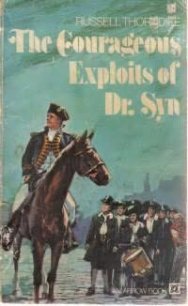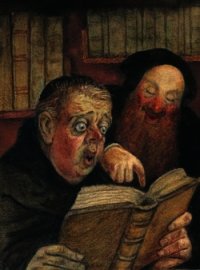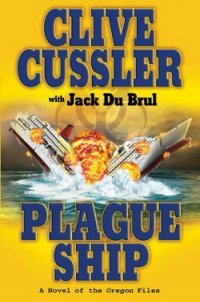Doctor Syn on the High Seas - Thorndike Russell (читать лучшие читаемые книги TXT) 📗
surgeon bewildered their simple minds with the longest medical words at
his disposal, and the most of them were thankful that the stiffened dead
man’s hand was completely covering the actual wound.
A verdict of “Death in an Affair of Honour” was returned, and the
coroner wound up proceedings with a tribute to the young parson’s
courage, and to Captain Tappitt’s impartiality. The Captain’s behavior
had been gentlemanly throughout, and he hoped he would live long to
enjoy his sudden inheritance.
The results of the inquest brought another flood of congratulations
to Doctor Syn from all classes of the town and countryside, to which Syn
replied wistfully that he had yet to face the Bishop of The Diocese on a
charge of violating his cloth.
But the Bishop, neither wishing to fly in the face of public opinion
nor to give the appearance that he was swayed by it, pretended to be
ill, and begged the Chancellor to take over full responsibility and
advise him of the results. The Chancellor pointed out to his Lordship
that although nominally Head of the University, and conveniently
resident in Oxford, the duty of presiding over such a court must fall
upon the Vice-Chancellor, who was responsible for keeping the peace in
the colleges. Fortunately for Doctor Syn, this important official was
also his good friend, so that when two days later the young Doctor took
his stand before an assembly of clergy convened in the Sheldonian
Theater, he felt confident that the court would take no drastic steps
against him.
- 51 -
The Hall was packed, not only with students, but with all the fashion
of the neighbourhood, and although the Vice-Chancellor thundered against
the evil practice of dueling, warning the students that should any of
them take part in such an affair he would be sent down in disgra ce, yet
he owned that in this particular case he felt obliged to deal mercifully
with such a brave young man.
Thus was Doctor Syn acquitted, and that very night a supper was given
in his honour by the students. Both Tony and Nicholas went with him,
and since it was held in an upper room of the old Mitre Inn, which
Doctor Syn was in no mind to check, the jolly students drank themselves
beneath the table. Neither Tony nor Nicholas could out drink Doctor
Syn, and they afterwards confessed that although he drank as much as
any, he was the only one who remained sober. Nicholas swore that such a
grand capacity was wasted in a parson. But Doctor Syn was yet to know
how useful it was to be able to consume more bottles than the next man
and yet come out clear-headed.
In the days that followed, Doctor Syn discovered that an admiration
which he had never quite resisted for Nicholas had developed into a fast
friendship. Possessed now of his uncle’s wealth, the young man began to
enjoy life with zest, and insist ed that his friends should do the same
and share his fortune with him. Nothing could daunt his kindness and
concern, and he would wave aside their continual gratitude with “I am a
friend of the family, I hope?” Imogene especially delighted in his
company, and Doctor Syn was glad of this, since, owing to the mother’s
illness, Imogene was kept somewhat a prisoner in White Friars. Nicholas
was a welcome relief to the girl from the monotony of nursing. It was
delightful to talk of her beloved Spain to someone who knew it well and
could converse in excellent Spanish. He was also a proficient performer
on the guitar, and could sing her favorite love-songs.
Seeing that Imogene loved to speak her native tongue and her it
spoken, Doctor Syn resolved to learn, and in this he was helped as much
by Nicholas as by Imogene herself. On one occasion when Nicholas had
praised him for an improved accent and an ever-growing vocabulary, the
Doctor cautioned him in jest with:
“You must take care, you know, for I shall so on be understanding all
you say to one another.” At which Nicholas laughed and said:
“I have no guilty secret, since I have always told you to your face
how much I am in love with Imogene, and one of the things that makes me
love her more is that she is in love with one for whom I have the
deepest affection. Aye, and for Tony too. He also is a man after my
own heart.”
This affection he took every means to prove, and at this time the
lovers owed him much, for when the question of their immediate marriage
had been breached, the Senora had proved querulous, complaining that her
daughter was regarding her as a hampering invalid. This unjust
accusation hurt the lovers deeply, but Nicholas, laying the blame upon
the mother’s nerves rather than any settled wish, at once began to set
the matter right, and his business in their affairs had a happy and
speedy result; for at this first argument upon the matter, he returned
and told his friends that he had persuaded her to admit that she was
fond of Christopher, though him a suitable husband, and that her chief
desire was to get well quickly in order that she could take her rightful
part in the wedding festivities.
This news delighted Tony as much as the lovers, for it had been his
idea that a double wedding would be the grandest occasion, since his
parents treated Doctor Syn as another son. But it was Nicholas who made
all the arrangements, and through his energy both sets of banns were
cried upon the
- 52 -
very next Sunday at Christ Church. The invit ations were sent out
immediately, and at his own request Nicholas was appointed Best Man in
attendance under Doctor Syn.
Some days before the actual ceremony, the Pemburys and the Cobtrees
set out with a vast retinue of servants from distant Romney Mars h. All
through the preparations Doctor Syn had nothing but admiration for
Nicholas, who seemed capable of running everybody’s business and his own
as well. It was he who even arranged the two honeymoons.
“I suggest,” he said, “that Tony and his bride accept my offer of the
Iffley Farm in the Cotswolds. The house is comfortable, though remote,
and that scenery romantic. They will be well cared for by my tenants.
Then, since Sir Charles and Lady Cobtree are to be in London for their
annual visit, what better than that you, Christopher, should take
Imogene to Dymchurch? You have been offered the Court-House during the
family’s absence, and Imogene will have opportunity to know the village
which will be her future home, when you decide to leave Oxford and
become Vicar of the Marsh.”
He also undertook the convey the Senora back to Spain aboard his
trading-ship, for the Senora had decided to return to her own people
after the wedding.
Although Nicholas proved himself a “friend of the family” indeed.
Needless to dwell on the gay happiness of those festivities. Thanks
to Nicholas, all went with a swing, and when at last the radiant couples
drove off in their respective carriages, the many guests declared that
never had young married people started out upon the voyages of mutual
responsibilities under more favourable auspices. The one tinge of
sadness was Imogene’s parting from her mother, but it was understood
that as soon as times permitted, she and her husband would take passage
with Nicholas and visit her.
The days that followed were the happiest of the Doctor’s life. He
had been granted a month’s vacation from his College duties. He was
then to return to Oxford work until his induction to the Dymchurch




